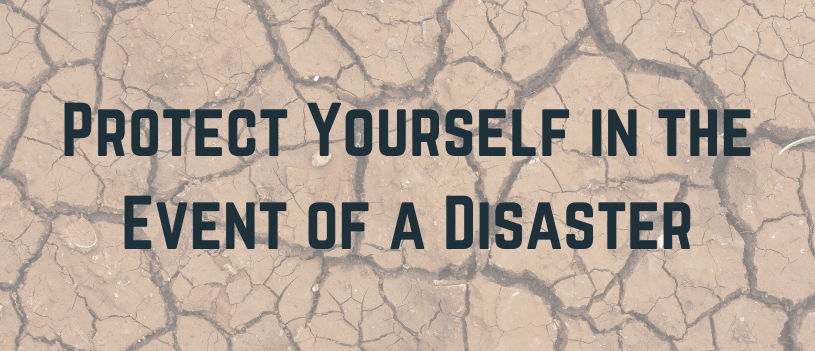Although no one likes to think about the fact that we may face a serious disaster, it is important to prepare for one in the event it happens to us. These can be situations such as a major traffic accident, medical event, or natural disasters.
If you are a business owner, you need to plan for protection for yourself personally and your business. What types of things should you do to prepare?
- Proper Insurance – Whether you are protecting your home or business office, your vehicle, or your employees, proper insurance is imperative. You may need multiple types of policies to protect various aspects of your company. For instance, we easily think of general liability and auto insurance, but did you know if you operate out of your home that your personal insurance won’t cover accidents that happened there if for business purposes? Making sure to have coverage for things such as professional liability, data breach, worker’s compensation and employment practice liability should be considered.
- Disaster Plan – Do you have a plan in place for what to do in the event you can’t operate your business due to power loss, extreme weather or other scenarios? Would you be able to run your business from a temporary location, and if so, what processes would you need to follow to be able to do so? What about if something were to happen to you? How would your company be able to run with others at the helm until you recover? Documenting what should be done, especially if you have staff, is best completed long before it is needed, so think about what you can do to write out a procedure for how your work would continue in the event of a disruption.
- Documentation – Although, when natural disasters occur, government agencies often extend the due dates for tax payments and filings, you still need to have the paperwork to support your tax returns and other business forms. How are you making sure you will have everything you need? With online banking, many could get some financial paperwork, but what about copies of client invoices and amounts due to you, bills you have paid, or receipts for cash purchases? How are you storing information so it’s accessible in the event a natural disaster such as fire, flood or tornado destroys physical items stored onsite? Making sure you have paperwork stores for easy access, and preventing loss is important.
- Financial – I know it’s been hard with the pandemic to save for your future. But be sure to do what you can to build up funds for unexpected emergencies. Whether it’s the need to purchase new equipment for expansion (or because your computer just gave out), having to repair your vehicle, build up your retirement nest egg, or to save for a rainy day, think about what you can do now to start putting money away in an account you won’t touch to have cash reserves for when they are truly needed. This may mean you need to cut back on some unnecessary expenses, (and remember some things you think are important may be able to be done without).
I encourage you to really look at your business and where the risks currently lie and do what you can to shore up those areas. We hope we won’t have to face a disaster, but the likelihood that something can happen should be an incentive to get things put into place now. If the time comes when you need it, you’ll be glad you did!
If you need help in any of these areas, reach out to us at 310-534-5577 or [email protected]. If where you need help isn’t our area of expertise, we’ll be happy to refer you to someone who can help!
